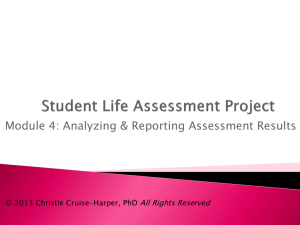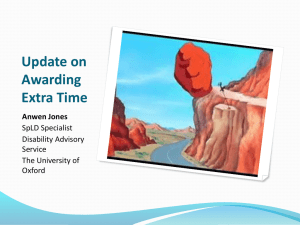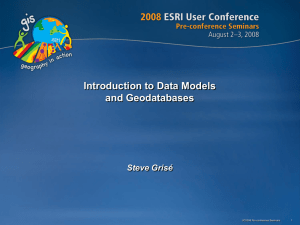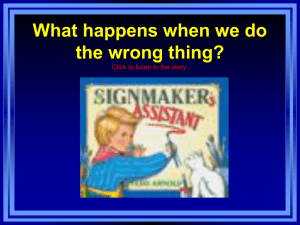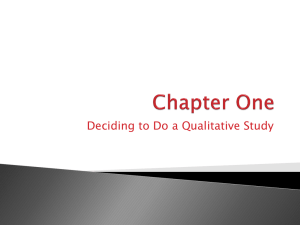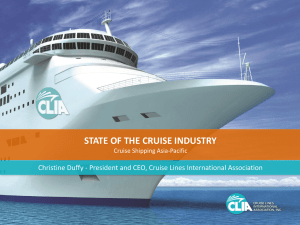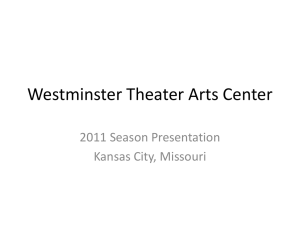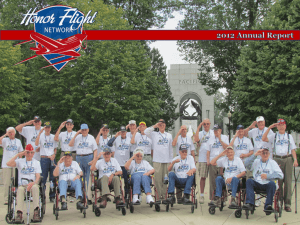Deliverable template (printed)
advertisement
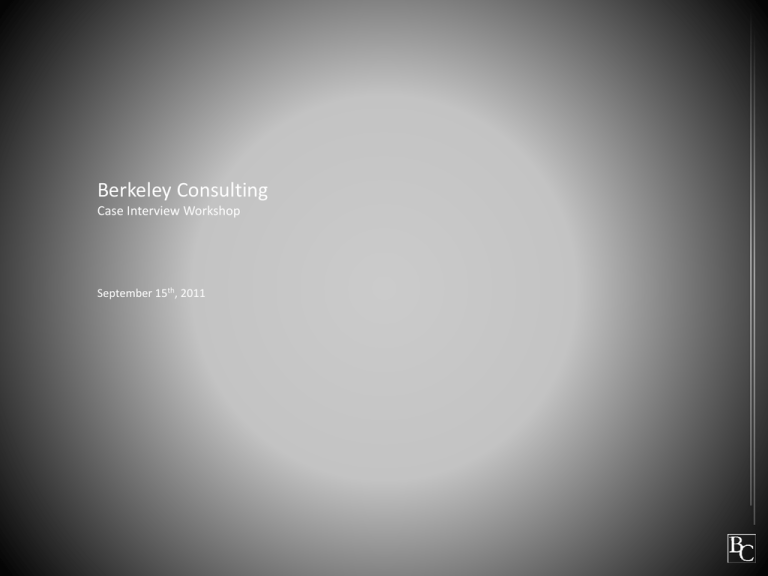
Berkeley Consulting Case Interview Workshop September 15th, 2011 Agenda Introductions What is a Case Question? Sample Case Question: Air France Profitability General Tips for Case Questions Small Group Breakout Section Introductions Introductions Sharvani Srivastava Olivier Bouan Year: Junior Year: Senior Semesters in BC: 4 Semesters in BC: 6 Major: ORMS Major: IEOR / Global Poverty Minor Positions Held: Positions Held: • Consultant • Consultant • PM • PM • AM • AM Summer 2012: Intern at Retargeter (Tech Startup) Summer 2012: Associate Consultant Intern at Bain & Co. Summer 2013: Currently recruiting Summer 2013: Industry Internship What is a Case Question? What is a Case Question? A case question is a type of interview question which is designed to test an individual’s ability to succeed during an actual consulting project. By presenting candidates with the type of questions and data typically faced during an actual project, the case question is a preferred way to test an applicant’s abilities. What Does the Case Interview Consist of? Case interviews usually test the following skills: • Behavior Section • Fit with the culture of the organization • Commitment to work • Quantitative Skills • Ability to do basic calculations quickly • Ability to organize numerical data and draw insights • Comfort with data presented in various ways • Qualitative Skills • Creativity of ideas • Organized and logical thought process • Ability to communicate meaningfully and concisely Sample Case Question: Air France Profitability Question Background Air France has hired BC to review it’s operations and help it define a path to increased profitability. Quantitative Section - Guesstimate To begin the case, please estimate Air France’s total ticket revenue in 2011. Quantitative Section - Guesstimate • Let’s break down Air France’s network into it’s short-, medium-, and long-haul components. • As a large airline, I estimate that France has roughly 200 destinations. • I assume that these are evenly split among short-, medium-, and long-haul • Use the following formula for each component: • ($/seat)*(seats /flight)*(flights/day)*(# destinations)*(% seats filled)*(# days in year) Quantitative Section - Guesstimate • Short Haul: • $100 per seat,100 seats per flight, 3 *round trip* flights per day, 70 destinations, 2/3 fill rate • 100*100*3*2*70*(2/3)= ~ $2.8M/day • Medium Haul • $200 per seat, 150 seats per flight, 2 RT flights per day, 70 destinations, 2/3 fill rate • 100*100*2*2*70*(2/3)= ~ $5.4M/day • Long Haul • $600 per seat, 300 seats per flight, 1 RT flight per day, 70 destinations, 2/3 fill rate • 600*300*1*2*70*(2/3)= ~ $16.6M/day Quantitative Section – Almost there • Sum across all three segments • 2.8M+5.4M+16.6M= ~$25,000,000 per day • 25,000,000*360 = a royal P.I.T.A., but really… • (25M*300)=75M*100=7,500M=$7.5B • (25M*60)=150M*10=1,500M=$1.5B • 7.5B+1.5B= $9,000,000,000 per year Quantitative Section - Guesstimate (Abstraction) Do you think this number is higher or lower than the actual FY2011 revenue, and why do you think this? Any guesses? Quantitative Section - Guesstimate The answer is likely a bit low: • From personal experience, it seems airline are generally able to fill airplanes more than 2/3 most of the time, so we probably underestimated the fill rate. (10% higher fill rate would increase our number by about $1B) • We didn’t account for business class. If 10% of passengers are business and pay 3X more, that’s roughly a 20%, or ~$2B increase. • Flight frequencies may be low, particularly for international flights. Going from 1 daily roundtrip to 1.5 daily roundtrips on international legs would increase revenue estimate by ~3B. Quantitative Section - Guesstimate (Abstraction) Actual Result: $24,000,000,000 Quantitative Section - Graph An Air France intern has provided you with the following chart about different segments of the Air France business. Please identify the major trends and give some reasons as to what may be behind those trends. Quantitative Section - Graph Profitability across flight segments 66% 63% 65% 70% 75% 71% 85% 75% 84% Fill Rate 50% 40% 30% Profitability 20% Economy 10% Business Total 0% -10% -20% -30% Short Haul Medium Haul Long Haul Quantitative Section - Graph Observations: • Short haul flights are highly unprofitable, driven by an unprofitable economy class • Short haul economy class suffers from a low cabin fill rate • Short haul also faces competition from high speed rail • Business Class remains profitable across all segments, despite comparatively low fill rates. • Long haul segments are most profitable overall, driven by a successful economy class which likely accounts for most of the revenue. • Medium haul flights break even thanks to the business class offering • Fill rate seems to be the critical profitability driver for economy class Qualitative Section – Idea Generation After facing declining profitably over the last five years, the client would like to implement new strategies that can boost profitably. What possible steps can Air France take to increase their profits? Qualitative Section – Idea Generation Cost • Reduce cost of short haul flights by adopting no-frills culture (ex. Southwest) • Streamline short haul flights to reduce staff overhead and labor expenses • Invest in new fuel-efficient planes • Focus on second-tier airports to reduce operating fees Revenue • Improve ancillary fee revenue • Extra bags, ticket changes, better seats • Improve fill rate • Bag checking services, pricing relative to driving and train alternatives • Better transportation to and from city centers for biz and econ passengers • Reduce time spent at airports during departure and arrival • Better boarding procedures, mobile ticketing • Introduce economy plus and Wi-Fi options to short haul flights • Design special planes for areas with high number of business class passengers Qualitative Section – Advanced Due to steep losses in its short haul network, the client is considering divesting from its short haul network. Evaluate some of the benefits and disadvantages the client may face in divesting from its short haul network. Qualitative Section – Advanced Benefits • Cutting a significant cost center to focus on more profitable long haul routes • Opportunity to rebrand as a premium airline by reinvesting in medium and long haul network services (ex. Emirates) • Cutting high maintenance costs of short haul aircrafts and streamline maintenance along fewer large aircraft models • Opportunity to partner with train line competitors rather than competing against them Disadvantages • Loss of domestic-to-international passengers to competitors without proper train service integration • Restrictive use of membership points • Loss of profitable business class passengers • Less future insulation against highly competitive airlines • May lead to PR issues and poor brand image since lack of local flights may hurt local economies and many employees may lose jobs (=Strikes) • Alliance partners may not approve Qualitative Section - Recommendation You are now at the conclusion of the project and the client has asked that you present your strategic recommendations. Based on the data that has been presented to you and the conclusions that you have drawn in this interview, take a few minutes to prepare a final recommendation on how Air France can reach profitability and what should be done about it’s ailing short haul offering. Pretend we are the CEO and board of directors of the client company; walk us through your final recommendation and the rationale you used to reach your conclusions. Qualitative Section - Recommendation • My revenue estimate suggests that most of Air France’s business comes from Medium and Long Haul Business, which are currently profitable. • The Short Haul segment is weighing down on profits, leaving leadership with two options: divest from it or turn it around. • Not only would dropping Short Haul service be difficult from a PR and alliance perspective, but it could drive non-Paris based international customers to other airlines. • Focus should be on driving the Short Haul service to profitability by retooling and reinvesting in the domestic network in the following ways to better compete with high speed rail: • Streamline flight routes to reduce cost overhead (e.g. Southwest bus model) and improve fill rate. • Invest in Airport time saving services for customers • Offer services like Wifi and City-Center Transportation to offer a more competitive travel experience. Some General Tips for Case Interviews General Tips for Case Question • Ask as many clarifying questions as you think are necessary • Make sure you take time to think through the question – nobody expects you to respond right away • The first/most obvious answer may not always be the best • Use numbers that are easy to work with – rounding numbers / approximating numbers is OK • Divide larger populations into smaller groups that are more specific and easier to work with • Organization of your ideas is as important as what your ideas are • Be creative and think about the scenario from different perspectives • Be confident, have fun, and take everything as a learning experience! Questions? Any Questions? Small Group Breakout Please break up to assigned groups Small Group Breakout Please break up to assigned groups

